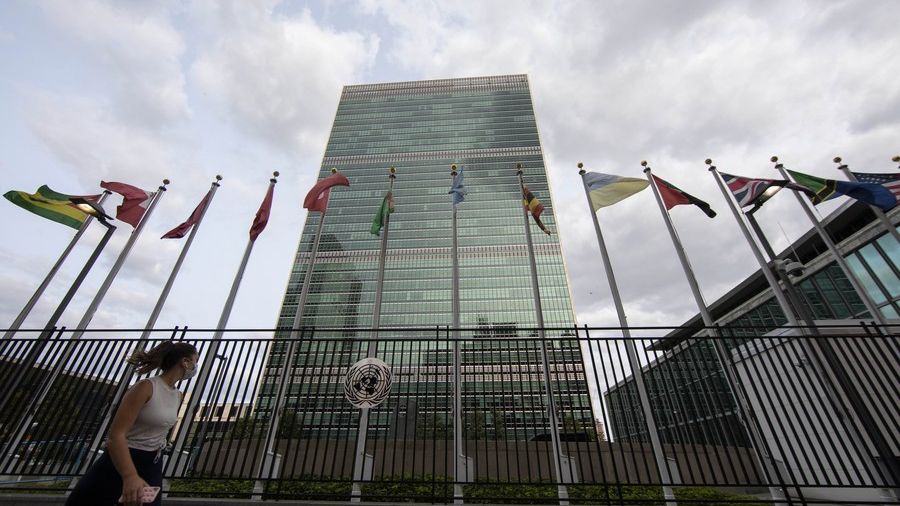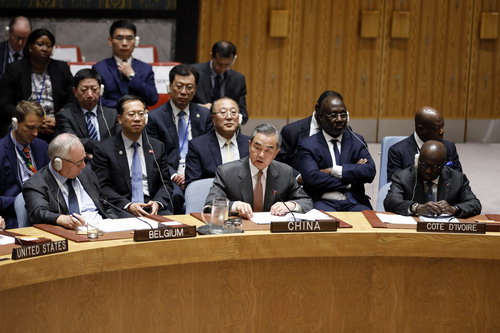
The United Nations headquarters in New York, the U.S., September 14, 2020. /Xinhua
The United Nations headquarters in New York, the U.S., September 14, 2020. /Xinhua
Editor's note: Stephen Ndegwa is a Nairobi-based communication expert, lecturer-scholar at the United States International University-Africa, author, and international affairs columnist. The article reflects the author's opinions and not necessarily the views of CGTN.
On October 20, China's Foreign Minister Wang Yi represented his country in a virtual ministerial session of the United Nations Security Council (UNSC) on the Persian Gulf region situation. It was an ideal occasion for China to reiterate its multilateralism policy that has become the country's foreign relations stronghold in solving not just the Gulf conflict but global crises as well.
Wang's remarks were based on three points critical in safeguarding the comprehensive Iran nuclear deal.
The FM talked about collective consultation, adhering to the principles of mutual respect, mutual understanding, and mutual accommodation, and constantly building consensus and dynamically adjusting the agenda.
Still, mutual respect and self-determinism are not synonymous. Wang noted that operationalizing the Joint Comprehensive Plan of Action was the onus not just of the signatories to the accord, but also of other countries in the Gulf region. In addition, other countries outside the region that have reasonable demands and can help in the search for positive outcomes in promoting regional peace, security, and stability have a role to play.
A budding superpower in its own right, China is one of the five permanent members of the UNSC alongside four other countries, namely France, Russia, the UK, and the U.S. In its unique position as the biggest developing country holding this position, China stands at a vantage position in playing the pivotal role of advocating for the South's interests. Moreover, by using their veto powers, China and Russia can bring a sense of balance in the decisions of the UNSC.
The speech by UN Secretary-General Antonio Guterres read straight out of China's foreign policy doctrine, which revolves around multilateralism. His speech was spiced with choice phrases that include "work in unison," "spirit of solidarity," "work collectively," "recognize what unites us", and "create a climate of trust." The bottom line of the speech was that the days of one-sided negotiations or dictating terms were no longer tenable.
Basically, piecemeal, divide-and-rule tactics and unilateralism will only escalate the current fragile security situations not just in the Gulf region but in the world as a whole.
The solution, in Guterres' words, is to "keep the interests of the region's people front and center – their aspirations for freedoms, opportunities, better standards of life and peace."

Wang Yi attends the UNSC Open Debate on Peace and Security in Africa in New York, the U.S., September 26, 2019. /Chinese Foreign Ministry
Wang Yi attends the UNSC Open Debate on Peace and Security in Africa in New York, the U.S., September 26, 2019. /Chinese Foreign Ministry
The Persian Gulf countries include those in the larger Middle East region. The common denominator with these countries is that they are mainly Arabic-speaking Muslim nations whose economic mainstay is oil. Until recently, they have all been perennially opposed to the State of Israel.
But this year has witnessed the rapprochement of a couple of them with Israel at the behest of the U.S. Bahrain, and the United Arab Emirates recently signed normalization agreements with Israel. Still, the journey ahead to full diplomatic relations between all the remaining Gulf countries and Israel is long and treacherous.
On September 26, 2019, Wang attended the UNSC Open Debate on Peace and Security in Africa at the UN headquarters in New York. In the spirit of multilateralism, he observed that "peace and security in Africa not only concerns the well-being of the African people but is closely linked to the peace and stability of the world."
While China has continued to help the second-largest continent tackle its issues, it also respects the fact that Africa is capable of managing its challenges. But the FM underscored that it was "incumbent upon the international community, particularly the UNSC, to help Africa achieve peace and security."
This is definitely significant because the continent comprises one-fifth of the global population, and its challenges constitute two-thirds of the UNSC's agenda.
While China has been a faithful and active member of the UNSC, it has refrained from exerting any undue influence in other countries' internal affairs, particularly members of the security body.
This is opposed to countries like the U.S., which never shies away from meddling, oftentimes aggravating internal and regional conflicts in its quest to tilt the balance of power to its advantage, politically, ideologically, or economically.
The dire situation in the Gulf region and the Middle East as a whole can be alleviated with less U.S. dictatorship of terms and one-sided support of its allies.
Borrowing from China's foreign minister during the UNSC open debate last year, the UNSC should listen more to the voices of the Gulf states, broaden and deepen cooperation with all players and, "respect their opinions and let them play their roles."
(If you want to contribute and have specific expertise, please contact us at opinions@cgtn.com.)